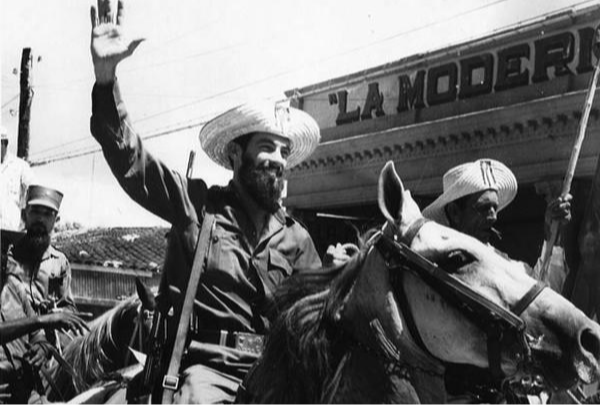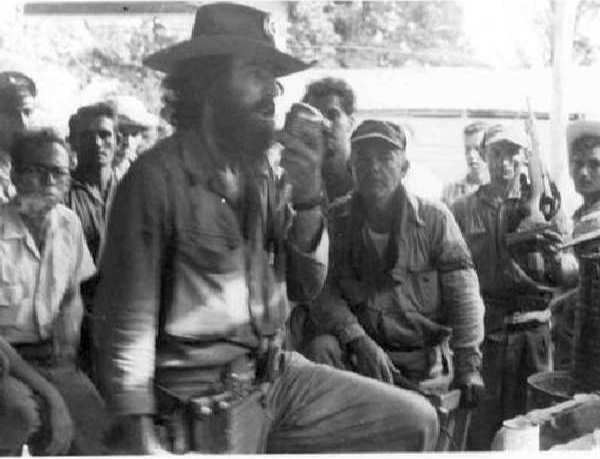
The Moncada barracks in front of the Capitol in Havana (Photo: Perfecto Romero)
By: Arelys García Acosta, Radio Habana Cuba correspondent in Sancti Spíritus
The days with their dark, rainy and mystical nights are once again touching the skin of the fighter José Luis Rodríguez Carrillo. The memory makes it obligatory to return to the Jobo Rosado camp, the place he had chosen to settle No. 2 Antonio Maceo, led by Commander Camilo Cienfuegos.
In memory of that early morning of 7 October 1958. The guerrilla force of about 90 men, tattered and hungry, was a ghostly shadow in the distance.
"The first fighters arrived and Félix Torres asked one of them about Camilo; the answer was: 'Go on, he's the last one in the column'. When he got to the end, he asked again and was told: 'He's number one in the line'. He returned in silence, and when he entered the house of a farmer who made charcoal, Camilo was sitting there. They greeted each other and Torres spoke of leaving the ranks, to which he replied: 'You will continue to be the leader of your group, you will continue to be the commander.
"They arrived barefoot, with torn feet and dirty, torn clothes. There were some hammocks and Felix sent them to bed and ordered the comrades under his command to heal their feet, give them medicine and take care of them. It was painful to see them like that.
More than five decades have passed and even old José Luis feels the lack of those 'camiladas' that used to break the fog of boredom or relieve fatigue.
"One morning he was sitting in a hammock and said to me: 'Hey, guajiro (peasant), I feel like some rice pudding. I lived in front of a cowshed and I told my wife to make me a bucket of rice pudding, she was a specialist. When I arrived at the camp and she saw me, she was very happy and started laughing and telling people: 'Don't let anyone come, I'm going to eat it all by myself'. Then he sat down on a hammock and began to distribute, pouring a little into each can and everyone caught up".
"Before the battle he said to Félix Torres: 'You and your men go through the front of the barracks, I'll go in the back. Felix told him: 'Don't do that' and he replied: 'Don't worry, I'll do it and don't fire until I throw the flare. When he crossed the wire fence, he threw the flare and the shooting started; it was a real firefight, because when the fighting started, Camilo was already inside the barracks. This man was really brave".
28 OCTOBER 1959. When Camilo disappeared after taking off from Camagüey airport, an intense search began in the maniguas(countryside), shallows, canals and open sea. José Luis was among the thousands of citizens who combed the central region of the country.
"There was not a mangrove key that we did not search. We went along the coasts and also offshore and found no trace. Those were very hard days, because he was very dear to us. The people of Yaguajay felt it the most. Camilo would arrive here and everyone would surround him, he would greet the old people, his charm was to carry the children. With his group, he was a whole people. I say that even today the people of Cuba are still Camilistas, and I am a Camilista a thousand times a thousand.

Commander Camilo Cienfuegos
OTHER MEMORIES
Luis Manuel González Castro points out the places in the geography of Yaguajay that remind him of the rebel commander.
Sitting on a tree trunk in the rigid space left by the thick grass, the old craftsman, aware of how much there is in the bush, returns to the threshing floors of Jobo Rosado, Vergara, Iguará, Alicante.
After a silence of evocation, the words come with the exact strokes of the hero of Yaguajay.
"The day I met Camilo, I was a pilot in Felix Torres' column. Felix introduced him to my brother Mario Jose, who was called Cheo Manigua. Camilo, who never missed a joke, told me: 'If your brother is Cheo Manigua (Cheo Country), you will be Manolo Matojo'(Manolo Bush), and the name was passed on to my son and grandson. This is the legacy that Camilo left me.
"I took a message from him to Santa Clara so that they could leave food for Che. On the way back, I took a detour with Félix Torres' wife, Juanita, who pretended to be pregnant but was carrying dynamite. Imagine the responsibility I carried with me every time I went on a mission. I think that luck always helped me; it was not easy for me to leave a path, a footpath, and those were difficult walks from Jobo Rosado to Punta Alegre, from Juan Francisco to Jobo Rosado.
Reymundo Rochela Hernández (Mundo) was 19 when the guerrilla leader gave him his first Springfield rifle: "This is your mother, your father, your family, don't lose it," the people from Yaguajay recall with a vivid and firm memory. He says no more, emotion cutting short the memory of a man who is confirmed as the man of a thousand anecdotes, as his close friend Ernesto Guevara described him.
On this 28th of October, the sea, the rivers... every body of water in the vicinity is filled with new and fragrant flowers; it will always be so, because his smile, his hat, his heroic stature have not been lost in the memory of his people.

